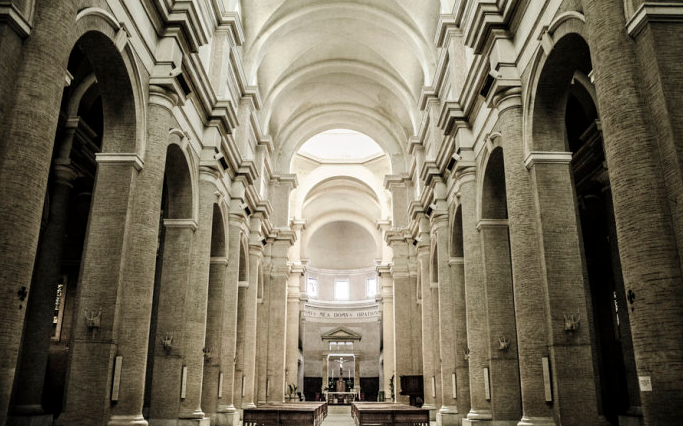Blood in ancient Rome ran thicker than marriage vows.
在羅馬,血緣關系比婚姻誓約更深厚
A divorced woman was returned to the control of her oldest male relative until she remarried.
離婚婦女可以回到家中受家中最年長男性的控制直到她再婚
A widow was returned to the control of her son.
寡婦受兒子的管轄
Unsurprisingly, a wife's status in Roman tradition was roughly equivalent to that of her children.
毫不吃驚的是,羅馬傳統中羅馬婦女的地位和她的孩子的地位相當
As the supreme god Jupiter was to the Universe,
因為至高無上的朱庇特主宰整個世界
so the father of the house was to his wife and to his children.
因此,一家之父主宰他的妻子和孩子
Roman society was the Roman family writ large.
羅馬社會顯而易見,都是這種家庭

The two social classes in early Rome
早期羅馬社會中有兩個社會階層
were the patricians, which consisted of the upper class and the lower class called the plebeians.
一個是貴族,包括上層社會,下層社會叫做plebeian
The word patrician is derived from the Latin word pater, meaning father.
貴族這個詞來自拉丁詞語pater 意思是父親
The word plebeian comes from the verb pleo, meaning just to fill up.
plebeian來自動詞pleo意思是填滿
According to the almighty mos maiorum,
根據無所不能的祖先的道路
the patrician class's relationship to the plebeians
貴族和平民的關系
was analogous to the power of the pater familias over his wife and children.
類似家庭中父親對孩子和妻子的關系擁有絕對權力
Once the ancient Roman kings were run out,
一旦羅馬國王任期結束
only patricians got to hold elected office and wield the almighty imperium.
只有貴族能執掌選舉政府行使無上的統治權
Only patricians could command armies and dispense justice.
只有貴族能指揮軍隊分配法律
Plebeians were expected to do as they were told without any hope of bettering their lot.
平民應該按照指示做事而不應該希望改變自己的命運
Marriage between the two classes was strictly forbidden.
兩個階層之間的通婚是絕對禁止的
But to help take care of plebeian social concerns,
但是照顧平民是社會所關注的內容
the Romans developed a practice called patronage,
羅馬有一項措施,叫做patronage
in which a given patrician served as patron.
也就是指定的貴族擔任保護人
Yet another word derived from pater, to a number of plebeian clients.
patron這個詞源自pater保護許多平民救濟對象
The patron provided his clients help with legal protection,
貴族為救濟對象提供法律保護
and he gave them hand outs when times were rotten.
在需要時提供幫助
He also commanded his clients in the army during war time and may even, when needed,have provided them with weapons.
戰爭時,貴族讓救濟對象參軍甚至在需要時為他們提供武器
In return, clients did whatever favors the patron might ask.
最為回報,救濟對象要滿足貴族的一切要求
They often lined up at his house at daybreak to say good morning,
他們通常白天使在他的屋子里排隊向他問好
and see if he had any work for them to do.
看看貴族是否有活讓他們做
If the patron was running for political office,
如果保護人參政
the clients were expected to follow the patron around and serve as his bodyguards
保護對象就要跟著保護人擔任保鏢
and/or his applauding audiences.
和,或者鼓掌的觀眾
This patron-client relationship extended to all parts of Roman life.
這種主從關系延伸到羅馬生活的方方面面
Also included in the mos maiorum
同樣包括在祖先的傳統中
was the cursus honorum or course of offices, through which a Roman could rise politically.
也就是一系列的官職通過這一舉措,羅馬人可以提升政治地位
Because opposition to monarchy had become a Roman core value,
因為反對君主制已經成為核心價值觀
the Romans believed that politicians should rise up a ladder of offices to the highest office or consulship.
羅馬人認為政治家應該升起階梯到最高的辦公室或者職位
While a politician didn't absolutely have to be a certain age to run for office,
盡管政治家不需要到特定年齡才能執政
or even to hold the office, previous office in the cursus honorum,
或者擔任職位擔任一定官職
exceptions were very few.
但是很少有例外
Holding a magistracy twice in a row was very strongly frowned upon by the mos maiorum.
連續執政兩年在先人的規定中是得不到支持的
And here the offices come from the top down.
這里的政府是自上而下的
Two consuls, minimum age of service 43 years old.
兩名執政官執政的最小年齡是43歲











